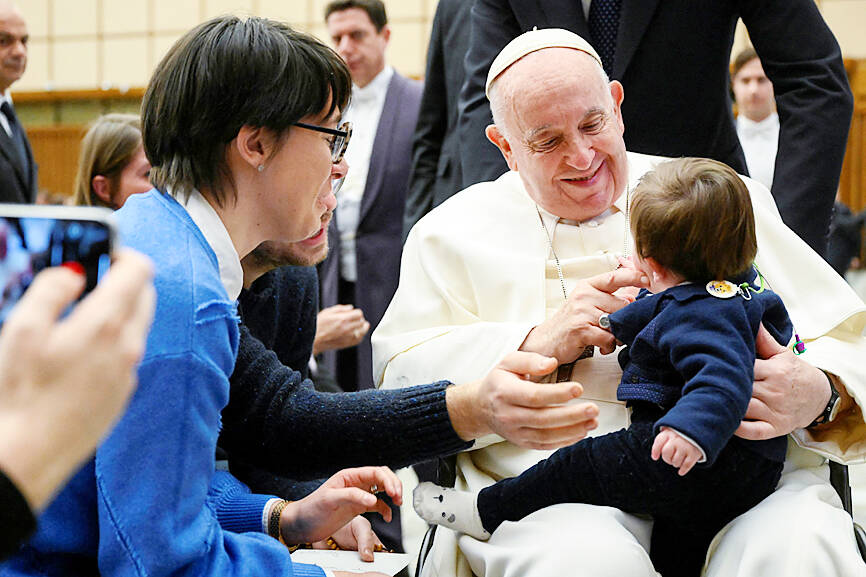President Tsai Ing-wen (蔡英文) told Pope Francis that war with China was “not an option,” reaffirming her desire to avoid a conflict that could drag in the US.
The president used a letter to the pontiff marking World Peace Day to press her case for a peaceful resolution of Taipei’s dispute with Beijing.
In the letter, which was released on Monday, Tsai expressed her support for the Vatican’s positions on Russia’s war against Ukraine and restated her stance on maintaining stability across the Taiwan Strait.

Photo: Vatican Media / Reuters
“Preserving regional security has become a key consensus shared by national leaders,” Tsai wrote.
“Peace and stability across the Taiwan Strait are the basis for the development of cross-strait relations,” she said, adding that “armed confrontation is absolutely not an option.”
The Vatican is the only remaining European government to have diplomatic relations with Taipei instead of Beijing.
“Only by respecting the commitment of the Taiwanese people to our sovereignty, democracy and freedom, can there be a foundation for resuming constructive interaction across the Taiwan Strait,” Tsai said in the letter.
Tensions between the US and China flared in August last year after then-US House of Representatives speaker Nancy Pelosi visited Taipei in the first such trip in a quarter of a century, prompting Beijing to hold massive drills and fire ballistic missiles over Taiwan.
Her successor, Kevin McCarthy, is planning to make his own trip to Taiwan in the spring, the political news site Punchbowl News reported on Monday.
Meanwhile, Pope Francis called for “patience” in the Vatican’s walk with China, saying that continued dialogue with Beijing was the guiding principle in his efforts to safeguard his flock, who are a small minority in that Asian nation.
The Associated Press, in an exclusive interview on Tuesday with the pope at the Vatican, asked what comes next in the diplomatic overtures between both countries.
“We are taking steps,” Francis replied. “Each case [of a bishop’s nomination] is looked at with a magnifying lens.”
“That’s the main thing, the dialogue doesn’t break,” he added.
As for Chinese authorities, “sometimes they are a little closed, sometimes not,” he said.
The pope sidestepped a question about how the Vatican’s relationship with Taiwan affects the dialogue.
Francis has been criticized by conservative factions of the Catholic Church for a 2018 agreement with Beijing over the appointment of bishops in China, given that Chinese authorities have at times imprisoned priests.
Among his harshest critics is Cardinal Joseph Zen (陳日君), the emeritus bishop of Hong Kong.
In the interview, Francis called Zen, who is 91, a “charming old man,” and a “tender soul.”
He recounted that, when the cardinal visited Rome this month for the funeral of pope emeritus Benedict XVI, the pontiff invited him to the Vatican hotel where Francis lives.
In front of the pope’s private study is a statue depicting Our Lady of Sheshan. Francis said when the cardinal saw it, ”he began to cry, like a child.”
Zen was arrested last year after he fell afoul of Hong Kong authorities over his participation in a now-silenced democracy movement.

The Taiwanese passport ranked 33rd in a global listing of passports by convenience this month, rising three places from last month’s ranking, but matching its position in January last year. The Henley Passport Index, an international ranking of passports by the number of designations its holder can travel to without a visa, showed that the Taiwan passport enables holders to travel to 139 countries and territories without a visa. Singapore’s passport was ranked the most powerful with visa-free access to 192 destinations out of 227, according to the index published on Tuesday by UK-based migration investment consultancy firm Henley and Partners. Japan’s and

NATIONAL SECURITY THREAT: An official said that Guan Guan’s comments had gone beyond the threshold of free speech, as she advocated for the destruction of the ROC China-born media influencer Guan Guan’s (關關) residency permit has been revoked for repeatedly posting pro-China content that threatens national security, the National Immigration Agency said yesterday. Guan Guan has said many controversial things in her videos posted to Douyin (抖音), including “the red flag will soon be painted all over Taiwan” and “Taiwan is an inseparable part of China,” while expressing hope for expedited “reunification.” The agency received multiple reports alleging that Guan Guan had advocated for armed reunification last year. After investigating, the agency last month issued a notice requiring her to appear and account for her actions. Guan Guan appeared as required,

Japan and the Philippines yesterday signed a defense pact that would allow the tax-free provision of ammunition, fuel, food and other necessities when their forces stage joint training to boost deterrence against China’s growing aggression in the region and to bolster their preparation for natural disasters. Japan has faced increasing political, trade and security tensions with China, which was angered by Japanese Prime Minister Sanae Takaichi’s remark that a Chinese attack on Taiwan would be a survival-threatening situation for Japan, triggering a military response. Japan and the Philippines have also had separate territorial conflicts with Beijing in the East and South China

A strong cold air mass is expected to arrive tonight, bringing a change in weather and a drop in temperature, the Central Weather Administration (CWA) said. The coldest time would be early on Thursday morning, with temperatures in some areas dipping as low as 8°C, it said. Daytime highs yesterday were 22°C to 24°C in northern and eastern Taiwan, and about 25°C to 28°C in the central and southern regions, it said. However, nighttime lows would dip to about 15°C to 16°C in central and northern Taiwan as well as the northeast, and 17°C to 19°C elsewhere, it said. Tropical Storm Nokaen, currently